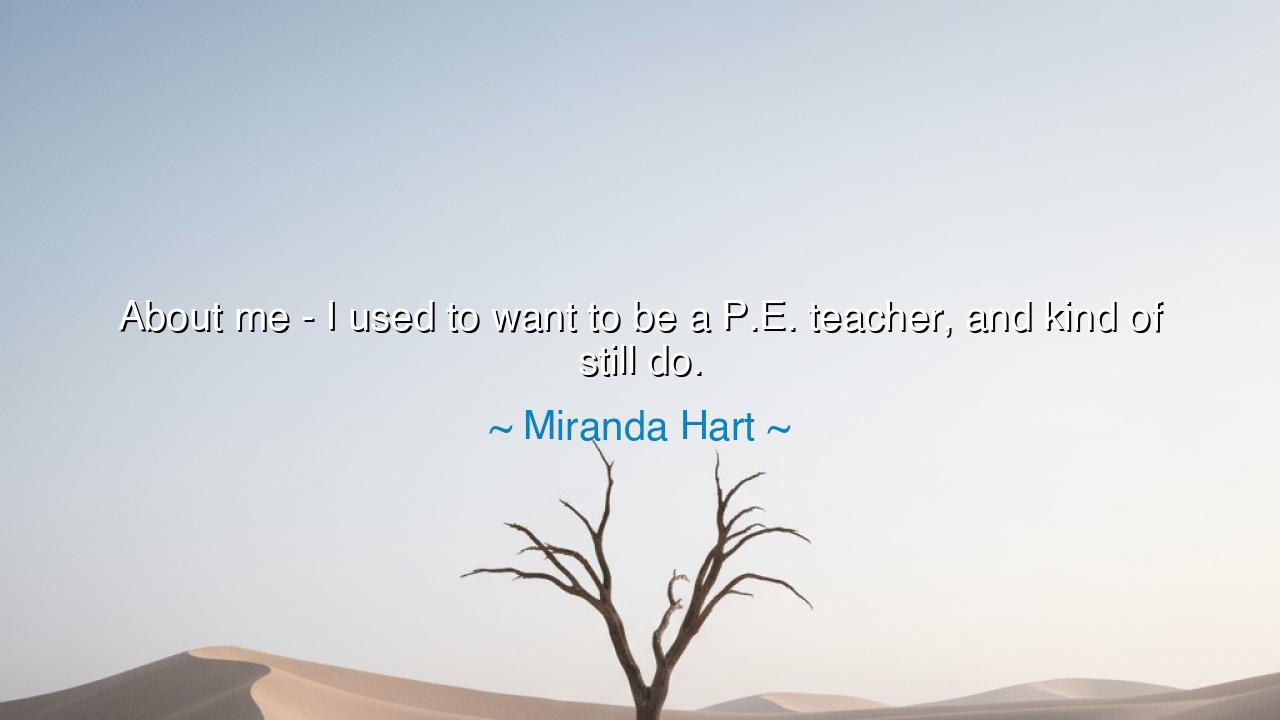
About me - I used to want to be a P.E. teacher, and kind of






Hear the words of Miranda Hart, spoken with simplicity yet filled with hidden depth: “About me — I used to want to be a P.E. teacher, and kind of still do.” At first glance, this utterance may appear light, almost casual, but beneath it lies a profound truth about longing, vocation, and the enduring call of dreams. For though the path of life may carry us into many lands, the early desires of the heart are seldom silenced; they echo across the years, reminding us of who we once wished to become.
To wish to be a P.E. teacher is not merely to stand in a gymnasium, but to guide the body into strength, to shape discipline, to awaken in the young a joy for movement and vitality. It is to teach not only the skill of the body, but the spirit of endurance, teamwork, and resilience. Thus, even as Miranda speaks with humor, there is in her words a yearning to return to that noble role: the role of one who nurtures others through the cultivation of physical strength and inner confidence.
The ancients, too, honored the teachers of the body. In the city of Sparta, children were raised under the stern yet devoted guidance of their instructors, learning to master not only the spear but their own flesh, their own fears. These teachers were more than trainers; they were sculptors of courage, guardians of discipline. In Athens as well, the gymnasium was not a place of idle play, but a sacred ground where body and mind were forged together. To be a guide in such a place was to take part in shaping the destiny of the people.
So too in our time, the longing to teach, even in something as humble as physical education, reveals the eternal desire to contribute to the growth of others. We may rise to fame, as Miranda Hart did, or turn to art, business, or invention, yet deep within us rests the voice of those first dreams. They may not always be fulfilled in their exact form, but they remind us of the truths we most cherish: the joy of helping, the desire to nurture, the wish to pass on strength.
It is heroic, in fact, to confess such a dream still lingers. For many bury their youthful desires, ashamed of them, dismissing them as childish or unworthy. But Miranda’s words remind us that these early longings are not foolish—they are sacred signposts. They reveal not merely a career, but the essence of what our soul finds meaningful. To want to be a teacher, in any form, is to hunger for service, for guidance, for giving. This longing never dies.
Therefore, the lesson is clear: do not scorn your first dreams. They may seem small compared to the grand paths you later walk, but they are the roots from which your journey began. To remember them is to remain true to your essence. Perhaps you cannot be exactly what you once desired—but you may live its spirit. If you dreamed of teaching, then teach in whatever way life allows. If you dreamed of healing, then heal with words, with kindness, with action. The form may change, but the heart of the dream remains.
Take practical steps, then: seek ways to embody your earliest calling. Mentor a child, guide a friend, volunteer in the service of others. Teach not only in classrooms or gyms, but in daily life, through your example, your patience, your encouragement. For every life offers countless arenas where we may be teachers, and every heart longs to fulfill that noble role in some measure.
So I say unto you: honor the voice of your first desire. Even if the world has carried you far from it, remember it still, as Miranda does, and let it guide you like a star in the night. For in returning to those dreams—not always in form, but in spirit—you will find both joy and purpose, and you will leave behind the greatest legacy: the gift of strengthening others.






AAdministratorAdministrator
Welcome, honored guests. Please leave a comment, we will respond soon